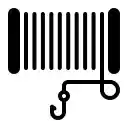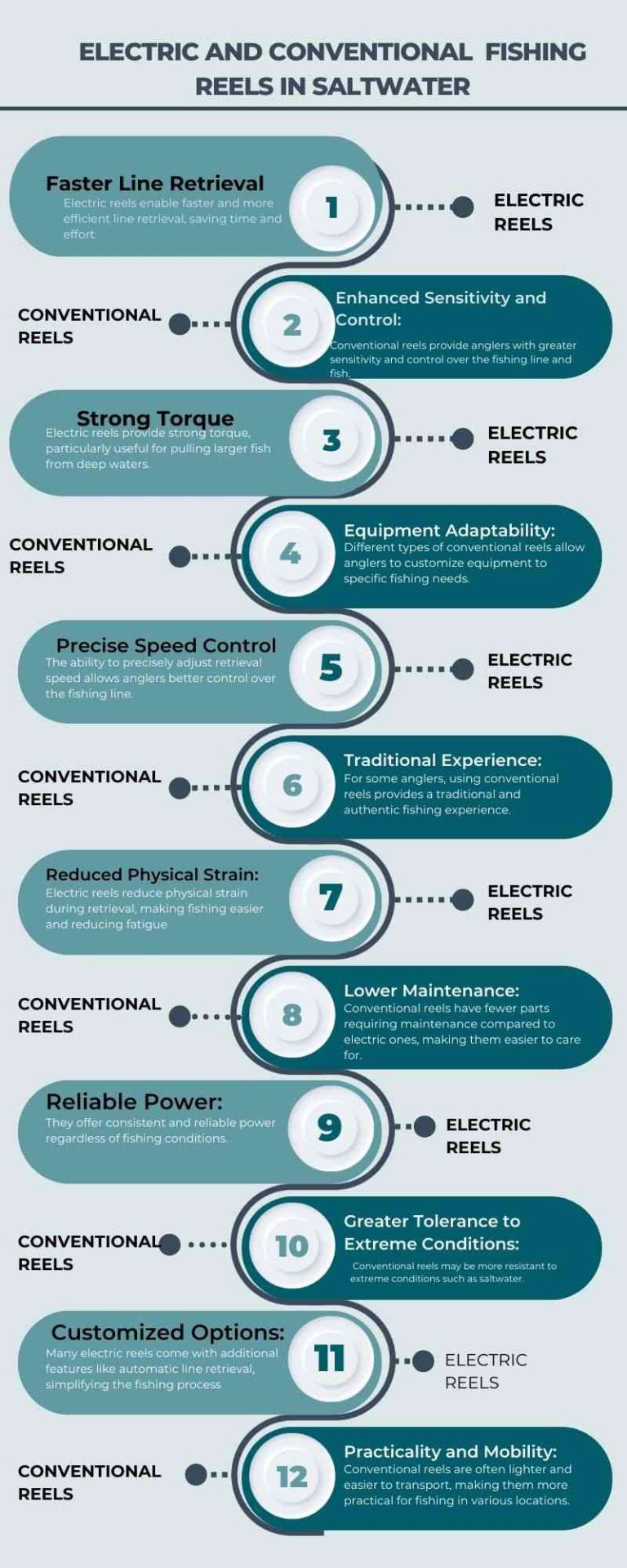Electric or Conventional: Find the reel that best suits you
Whether you're a beginner or an experienced angler, our detailed guide will help you discover the ideal reel for every fishing opportunity
Don’t let choosing a fishing reel become a difficult task. Our comprehensive guide reveals everything you need to know about electric and conventional reels, helping you make a decision that will enhance your fishing enjoyment and efficiency.
Fishing progress: Why choose electric reels?
The importance of choosing the right fishing reel
Selecting the appropriate gear for fishing can mean the difference between returning home empty-handed and having an unforgettable experience on the water.
With the introduction of electric reels, the fishing experience has undergone a revolutionary change, making it more efficient and enjoyable.
In this guide, we will explore the reasons why every dedicated angler should consider switching to electric reels, and how to choose the model that best suits your needs.
Although conventional reels will forever hold a special place among tradition enthusiasts, we cannot ignore the numerous advantages of electric reels, especially when it comes to deep-water fishing and battling big fish.
Read this guide and discover how choosing the right reel can transform your fishing experiences, making every fishing trip an unforgettable experience
The eternal dilemma of anglers: Electric or conventional reels?
This is an article about one of the most important choices in fishing – the choice between electric and conventional rods. Every angler knows that the right tool is key to a successful catch, but there is no one-size-fits-all solution.
Allow me to share some wisdom from my extensive career and help you make a choice that best suits your style and needs.
Electric rods: Technology at the service of the angler
Electric rods are a marvel of modern technology. They are ideal for anglers who are not afraid to use the advantages of automation to focus on the essence of fishing – strategy and enjoying the fight with the fish.
If you like to explore deep waters or battle with big, strong fish, an electric rod could be your best friend.
By reducing physical effort, these rods not only relieve you of the burden but also give you more energy to enjoy what you love most.
Conventional rods: Connection with tradition
Conventional rods are the heart and soul of fishing. They represent a bridge between you and the water, allowing direct contact and control that can be crucial in moments of battle.
For those who value precision, skill, and a direct experience in fishing, there is no substitute for a conventional rod.
Choosing this type of rod is a choice to dive deeper into the art of fishing, where every movement has its meaning.
How to decide?
The choice between electric and conventional reels is a decision that reflects your fishing philosophy. Ask yourself: what do I want to achieve on the water?
Am I looking for the most efficient way to big catches, or do I want each catch to be a reflection of my skill and patience? Your answer to this question will be your guide through the choice of equipment.
Conclusion: Respect for all styles
In the end, whether you choose an electric or conventional rod, it’s important to respect the diversity in fishing. Each style carries with it certain challenges and pleasures.
I, as someone who has experience in fishing, can tell you that the right choice is the one that allows you to enjoy every moment spent fishing to the fullest.
Follow your heart, anglers, and always be ready for new adventures that await you with every cast.
Electric reels for saltwater fishing
The advantages of electric reels encompass a range of characteristics that make them an extremely efficient tool for specific types of fishing.
Advantages of Electric Reels:
The first and most noticeable advantage is ease of use.
Electric reels allow the user to manage the winding process without significant physical effort, which is particularly useful in situations where it is necessary to pull fish from great depths or when the angler is faced with exceptionally large and heavy catches
The second significant advantage is their suitability for deep-sea fishing.
Thanks to their ability to automatically wind large quantities of line or wire, electric reels enable anglers to easily reach great depths where fish such as sharks, swordfish, or other large marine predators reside. This characteristic makes electric reels an ideal choice for anglers targeting large specimens.
The third advantage relates to the ability to handle heavy loads with minimal manual effort.
Electric reels are designed to withstand the large forces exerted on the line during battles with large fish. This not only reduces the physical effort required for control and retrieval of the fish but also increases the chances of a successful catch, reducing the risk of line breakage or loss of the catch due to inadequate equipment.
Technological Innovation.
The latest models of electric reels come with advanced features, including digital displays and GPS, enabling anglers to precisely track and target fish.
Overall, electric reels offer significant advantages in terms of efficiency, comfort, and fishing success, especially in specific deep-sea fishing conditions and when dealing with large and heavy catches.
These characteristics make them a valuable tool for any serious angler aiming to maximize their catch and enjoy the fishing adventure with minimal physical effort.
Conventional Reels
Returning to the roots, we talk about conventional reels – the foundation of fishing tradition.
These reels are a bridge between the angler and the water, providing an incomparable experience that cannot be replaced by anything.
Advantages of Conventional Reels
Conventional reels are the essence of fishing. They require skill, patience, and precision, and that’s why they bring immense satisfaction.
Here’s why many anglers, including myself, still consider them an invaluable part of their gear:
Selecting the appropriate gear for fishing can mean the difference between returning home empty-handed and having an unforgettable experience on the water.
With the introduction of electric reels, the fishing experience has undergone a revolutionary change, making it more efficient and enjoyable.
In this guide, we will explore the reasons why every dedicated angler should consider switching to electric reels, and how to choose the model that best suits your needs.
Although conventional reels will forever hold a special place among tradition enthusiasts, we cannot ignore the numerous advantages of electric reels, especially when it comes to deep-water fishing and battling big fish.
Read this guide and discover how choosing the right reel can transform your fishing experiences, making every fishing trip an unforgettable experience
Direct Control:
With a conventional reel, you are in complete control over winding and battling with the fish. Every movement, every tension, is directly felt through the rod, giving you an immediate experience of the fight.
Skill and Precision:
Using reels, fishing becomes an art. Perfectly executed casting and tactical winding require years of practice and skill enhancement, making each successful catch a true merit of the angler.
Reliability and Durability:
Conventional reels are built to last. Their simplicity and robustness make them a reliable choice for all kinds of fishing, from calm rivers to turbulent seas.
Why Choose Conventional Reels?
If you value skill and tradition in fishing, if you want each catch to be the result of your dedication and expertise, conventional reels are for you.
They provide indescribable pleasure when you successfully master a fish using your own strength and skill.
For all of you who want to learn more about conventional reels, this is a detailed overview.
You’ll discover how to choose the right reel for you, how to enhance your skills, and how to best utilize traditional fishing methods to achieve impressive catches.
Comparative overview of electric and conventional reels: Key characteristics and recommended usage scenarios
In modern fishing, the choice between electric and conventional reels is a crucial decision that can significantly impact the experience and success in fishing.
While electric reels offer technological innovations that facilitate fishing in specific conditions, conventional reels remain a reliable choice due to their simplicity, efficiency, and precision.
This table provides a comparative overview of electric and conventional reels, aiming to assist anglers in choosing the appropriate equipment based on key characteristics such as weight, power source, ease of use, price, durability, and recommended usage scenarios.
Understanding these differences is crucial for selecting the reel that best suits the specific needs and fishing style of each individual.
Characteristic | Electric Reels | Conventional Reels |
Weight | Heavier due to battery and motor | Lighter, simpler construction |
Power Source | Battery/electricity | Manual operation |
Ease of Use | High (automatic winding) | Medium to high (requires practice) |
Price | More expensive due to more complex technology | More affordable |
Durability | Depends on the quality of battery and motor | High, fewer moving parts |
Recommended Usage Situations | Deep-sea fishing, large fish | General fishing, precision in retrieval |
Key factors for choosing the right fishing reel: Buying guide
Choosing the right fishing reel is the foundation of a successful fishing experience.
Given the wide range of available options, understanding the key factors that influence this decision can be extremely helpful.
This guide aims to provide a comprehensive overview of the factors to consider when purchasing a reel, ensuring that the chosen model best suits the specific needs of each angler.

Fishing environment: Freshwater vs. Saltwater
The first step in the process of selecting the appropriate reel is identifying the primary fishing environment. Reels designed for saltwater are made of corrosion-resistant materials to withstand the aggressive conditions of the marine environment. In contrast, freshwater reels are often lighter and tailored to less demanding environments.

Reel size
The size of the reel should be aligned with other fishing equipment and fishing style. Larger reels provide more power and line capacity, which is ideal for tougher fishing conditions, while smaller reels are better for light fishing and precise retrieval.

Line capacity
Choosing a reel with the appropriate line capacity is essential for the targeted fishing style. A larger capacity allows for longer casting and retrieving of larger fish, while a smaller capacity may be suitable for fishing smaller species or in conditions requiring greater precision.

Target fish species
An important aspect when choosing a reel is considering the target fish species. Larger and stronger fish require more robust reels with greater line capacity and stronger mechanisms for fighting, while lighter fishing can be supported by smaller reels in size and power.

Gear ratio
The gear ratio of a reel is crucial in determining the speed and power during winding. A high gear ratio enables fast line retrieval, which is useful for fishing techniques that require quick response, while a lower gear ratio provides more power for fighting large fish.

Budget
Finally, the budget plays a significant role in reel selection. While a higher price often implies higher quality and durability, there are many affordable models that can meet the needs of most anglers without compromising performance
The advantages of using electric reels in saltwater fishing: Deep sea fishing, Jigging, and Trolling
Electric reels in saltwater fishing provide a range of advantages that can significantly enhance anglers’ experience and efficiency, especially when it comes to specific techniques like deep sea fishing, jigging, and trolling.
- Deep Sea Fishing: Electric reels are extremely useful for deep sea fishing in marine conditions, as they allow anglers to easily handle the line and reach great depths without significant physical effort. Additionally, advanced features of electric reels, such as digital displays and precise depth controls, enable anglers to target fish living at depth more accurately.
- Jigging: Electric reels offer significant advantages in jigging, especially when it comes to vertical jigging at great depths. Their ability to provide constant and controlled jigging action, as well as easier manipulation of equipment, makes them ideal for targeting large and fighting fish in marine waters
- Trolling: Although conventional reels are often used for trolling, electric reels can enhance this technique especially when deep trolling is required. Automated functions enable precise setting and maintenance of the desired line depth, which is crucial for efficient trolling.
Although electric reels may have a higher price compared to conventional ones, their durability, advanced features, and the alleviation of physical effort during fishing make them a valuable investment for serious anglers looking to maximize their chances of success at sea.
With proper maintenance, electric reels can provide years of reliable use, making every fishing adventure more productive and enjoyable.
When choosing an electric reel, it is important to consider specifications such as maximum drag force, line capacity, retrieval speed, and additional features like GPS or digital displays that can further facilitate fish locating and catching.
It is advisable to thoroughly research available models and select a reel that best suits the specific needs and fishing style of each individual.
Fishing Equipment for Saltwater Fishing
When choosing equipment for saltwater fishing, it is crucial to match rods, lines, baits, and reels, considering both electric and conventional reels.
The equipment should suit the targeted type of fishing, whether it’s deep-sea fishing, jigging, or trolling.
Electric reels
- Rods: Electric reels require stronger and sturdier rods capable of handling the weight of the equipment and the fight with large saltwater fish. Materials such as graphite or composite provide the necessary strength and flexibility.
- Lines: Braided lines are the best choice for electric reels due to their durability and ability to withstand heavy weights. They are ideal for deep-sea fishing and jigging at great depths.
- Baits: For deep-sea fishing and jigging, heavy metal jigs are recommended, capable of reaching the desired depth. For trolling, use large plastic or rubber baits that mimic fish.
Conventional Reels
- Rods: Conventional fishing rods should be durable and sensitive, allowing precise bait control and bite detection. Multi-piece rods offer greater strength and sensitivity.
- Lines: Monofilament lines are a common choice for conventional reels, especially for trolling and bait fishing, due to their flexibility and abrasion resistance.
- Baits: Live baits such as small fish or worms are often used with conventional reels for bait fishing. Artificial baits like crankbaits and plastic worms are used for casting and trolling.
Regardless of the choice between electric and conventional reels, it is crucial to match the rods, lines and baits with the targeted fishing technique and the type of fish you want to catch.
Electric reels offer advantages in efficiency and comfort, while conventional reels require more skill and provide a more direct feel during fishing
For thorough maintenance of electric reels, it is important to follow several steps:
- Rinse the Reel with Fresh Water: After each use, especially if used in saltwater, thoroughly rinse the reel with fresh water to remove salt and other impurities.
- Cleaning and Drying: After rinsing, carefully clean all parts with a dry, soft cloth. Ensure the reel is completely dry before storage.
- Lubrication: Regularly lubricate the moving parts of the reel using specialized lubricants. This will help reduce friction and prevent corrosion.
- Inspection and Part Replacement: Regularly inspect all parts of the reel for signs of wear or damage and replace them as needed.
- Storage in a Dry Location: Store the reel in a dry place, away from direct sunlight, to avoid damage and corrosion.
- For efficient maintenance of electric reels, it is necessary to regularly check and replace batteries, in addition to regular cleaning, lubrication, and storage. Battery maintenance is crucial for the proper functioning of the reel, as electric reels rely on the quality and lifespan of the battery. Ensure that the batteries are always sufficiently charged before fishing, and regularly check their condition and replace them as needed to ensure uninterrupted operation of the reel.
Follow these steps to ensure that your electric reel remains in optimal condition and extends its lifespan.
Basic steps for maintaining conventional fishing reels
- Regular Cleaning and Lubrication: It is important to clean and lubricate the reel after each use.
- Rinse with Fresh Water: After use, especially in saltwater, rinse the reel with fresh water to remove salt and dirt.
- Drying Before Storage: Dry the reel before storing it.
- Thorough Cleaning and Lubrication: Periodically disassemble the reel for thorough cleaning and lubrication of all moving parts.
- Use High-Quality Lubricants: Use lubricants designed for fishing equipment lubrication.
- Check for Damage: Regularly check the reel for signs of damage or wear and replace parts as needed.
- Storage in a Dry Location: Store the reel in a dry place away from direct sunlight.
Electric vs. Conventional reels: Angler's guide
When choosing between electric and conventional fishing reels, it is important to consider both the line retrieval speed and the reduced effort offered by electric reels, as well as the greater control and authenticity of experience guaranteed by conventional reels.
Our infographic presents the key differences that will help you choose the right type of reel according to your needs and preferences.

The importance of proper selection of fishing reels
Selecting the right fishing reel can be a crucial factor in your fishing experience. Whether you opt for an electric or conventional reel, it’s important to understand their strengths and limitations to make the most of your time on the water.
Electric reels offer technological innovations that can ease fishing, especially in deep waters or when battling large fish. On the other hand, conventional reels provide direct contact and control, giving anglers a sense of satisfaction and achievement with every catch.
Regardless of your choice, it is crucial to select a reel that suits your fishing style, the type of fish you want to catch, and the conditions in which you plan to fish.
Regular maintenance of your reel also plays an important role in ensuring longevity and efficiency, whether it’s simply rinsing with fresh water after use or more detailed cleaning and lubrication.
In the world of fishing, the diversity of approaches and techniques makes this hobby interesting and dynamic.
Whether you prefer peace and quiet using a conventional reel or enjoy the technological advantages of an electric reel, it is important to find equipment that best suits your needs and allows you to fully enjoy every moment spent on the water.
In the end, don’t forget that fishing is more than just technique and equipment – it’s passion, tradition, and a way of connecting with nature.
Regardless of the type of reel you choose, it’s important to enjoy every moment and appreciate the experiences that fishing provides.
